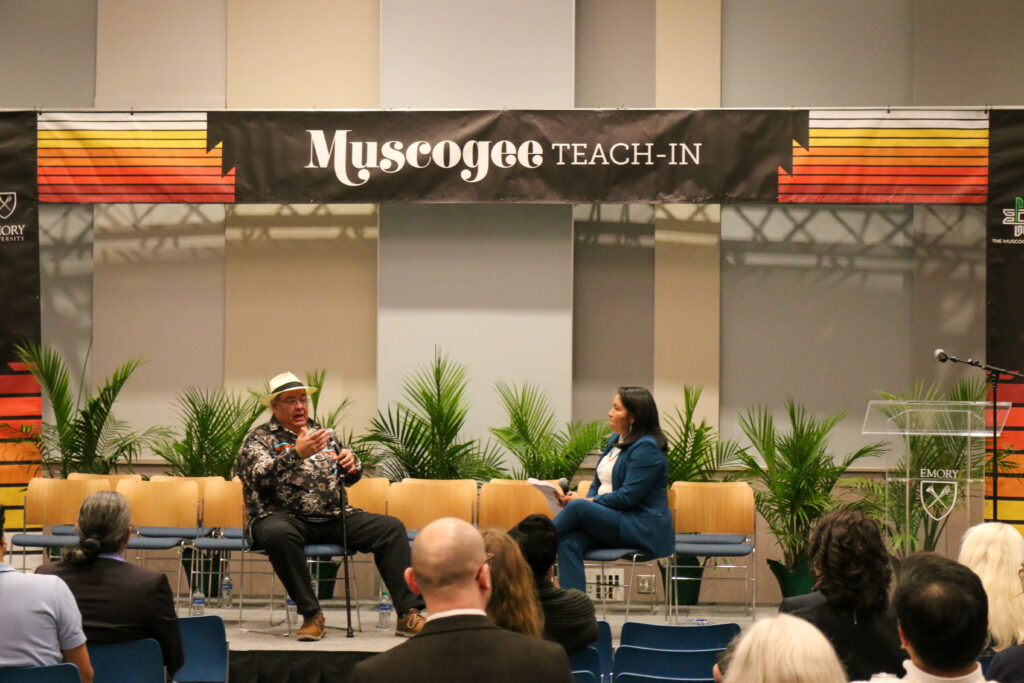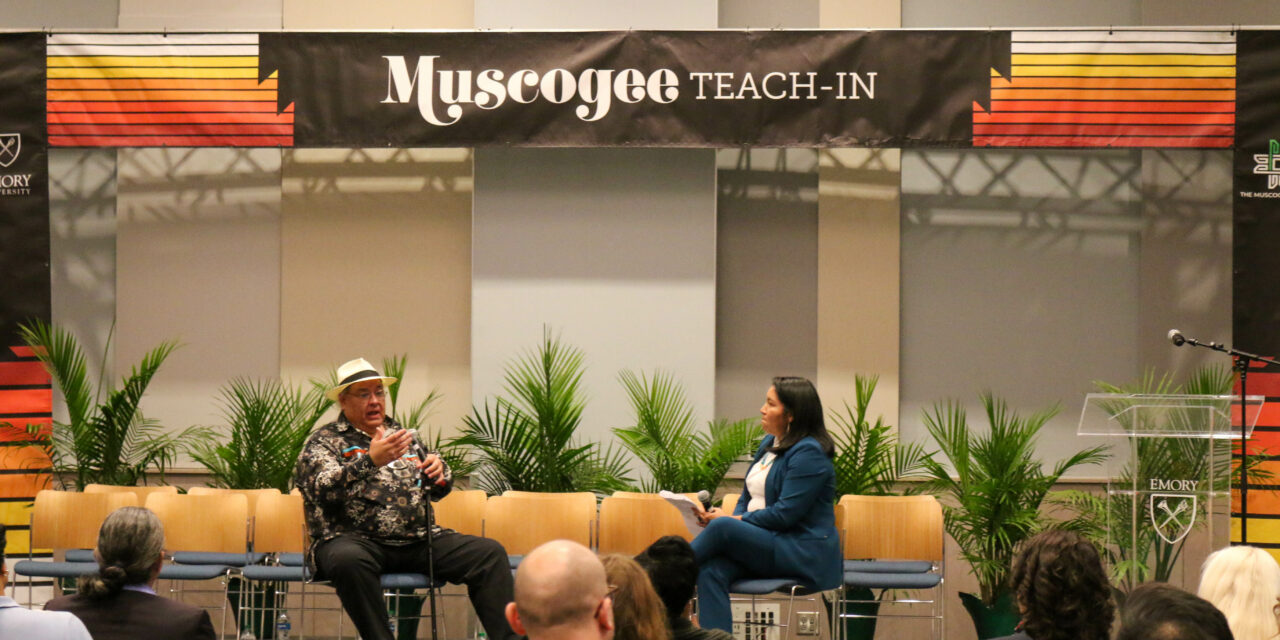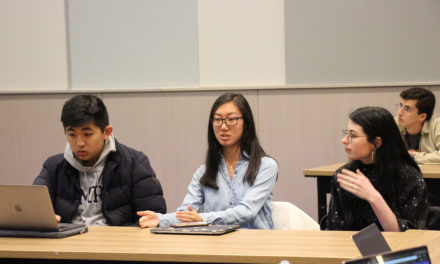Emory University held its second annual Muscogee Nation teach-in on Oct. 27 in the Emory Student Center. The event, which attracted about 150 attendees, was a demonstration of Emory’s ties to the Muscogee (Creek) Nation and a chance to honor and celebrate the tribe’s culture.
The Native American and Indigenous Studies Initiative, Office of the Provost, Emory College of Arts and Sciences, James Weldon Johnson Institute and the Office of Spiritual and Religious Life jointly sponsored the event.
Tre’ Harp III (25C), who is a member of the Muscogee and Choctaw Nations, opened the event with a brief speech expressing his appreciation to the University for the “unique opportunity” to foster Emory’s relationship with the Muscogee Nation.
Following Harp’s speech, Associate Dean of Admission and Lead for Native American Affairs Beth Michel (12PH), who is a member of the Tohono O’odham Nation of Arizona, expressed her gratitude for the event.
“We’re just really fortunate to have a relationship with the Muscogee Nation and the Muscogee community, to really bring forward an opportunity for us to grow and expand our knowledge,” Michel told the crowd.
Michel expressed gratitude to the audience for attending the event, which introduced members of the Emory community to the Muscogee language, Mvskoke. She reflected on the teachings of Tohono O’odham poet Ofelia Zepeda, noting that singing traditional songs “brings our heart calmness, it brings us a sign of peace and it also brings our mind wellness.”
“I hope that everyone here also walks away with the opportunity to have a well mind and a well heart,” Michel said.
Muscogee Creek Nation Second Chief Del Beaver also spoke at the event, noting the value of community within the Muscogee Nation.
“Life is not meant to be lived alone,” Beaver said. “Life is meant to be lived with people, life is meant to be shared.”

Associate Dean of Admission and Lead for Native American Affairs Beth Michel (12PH) speaks with Muscogee artist Johnnie Diacon during the second annual Muscogee Nation teach-in on Oct. 27. (Jack Rutherford/Senior Staff Photographer)
Beaver also discussed the importance of acceptance and inclusion among different cultures and communities. He explained that the world is far too difficult and heavy to tear each other down and encouraged members of the Emory community to support one another.
Language Revitalization Project Manager for the Mvskoke Language Program Eli Rowland-Chang, who is a member of the Muscogee Nation and helps the program preserve and revitalize the Muscogee language by implementing the language in public schools, led the singing of two hymns. Organizers distributed leaflets to attendees containing both the Muscogee and English translations of the traditional hymns.
Michel then led a discussion with Muscogee artist Johnnie Diacon. Diacon has nearly 40 years of experience in fine art and is a graduate of Bacone College (Okla.), which is a private tribal college, and the Institute of American Indian Arts (N.M.). He said his father was a sign painter, so he grew up around art.
However, Diacon explained that he is legally blind without corrective lenses, and it wasn’t until he got glasses as a child that he could finally see the art around him.
“A new world opened up for me,” Diacon said. “The first thing I saw was Native American art, unbeknownst to me, because I didn’t see it when I went in there. I didn’t even know it existed … It was like a vision.”
Diacon also recalled how growing up as a Native child in a predominantly white community pushed him to embrace the creation of Muscogee art as a symbol of togetherness and belonging. He said the art is not about him as an individual but about the Muscogee people, pointing out that most members of the audience saw his artwork before they saw him.
“You saw that image, you saw my people, before you saw me,” Diacon said. “That’s what’s more important is me putting my people out there. I always say, ‘I’ll be dead and gone one of these days, but those images will still be out there like my people.’ And so that’s another part of my calling to do this work.”
Emory students and Atlanta residents can see Diacon’s work at Hartsfield-Jackson Atlanta International Airport at Concourse T in the North Terminal. The exhibit, “This Land Calls Us Home: Indigenous Relationships and Southeastern Homelands,” opened on Nov. 6 and focuses on Native Americans’ connection to their ancestral lands.
Diacon concluded his interview by thanking Michel, to which she responded “Mvto,” which translates to “Thank you” in Mvskoke.
Carolyn NcBac, a school teacher for the Mvskoke Language Program, then read two traditional Muscogee stories, titled “How The Opossum’s Tail Became Bare” and “How Day and Night Were Divided.”
Jordan Squire, a program specialist for the Mvskoke Language Program and member of the Muscogee Nation’s Deer Clan, held up corresponding visuals to the stories. Rowland-Chang taught the audience how to pronounce several Muscogee words.
“We value all our people,” Rowland-Chang said. “We value all our words. There’s no silent letters in Mvskoke.”
The event concluded outside on McDonough Plaza with Reverend Chebon Kernell, who is of Muscogee Creek heritage and an ordained Elder in the Oklahoma Indian Missionary Conference, leading a stomp dance. About 16 Muscogee Nation members moved and chanted in a circle around a fire. After the first stomp dance, Kernell invited audience members to join in, which Morla Lester (27C) said she enjoyed.
Lester expressed her appreciation for the event and Muscogee tribe’s invitation for attendees to join in their traditions.
“In our current state of political divide, there is such a need for representation and showing people that it’s OK to be different,” Lester said.
Correction (11/10/23 at 11:26 a.m.): A previous version of this article stated that 60 people attended the teach-in event. In fact, about 150 people attended.





